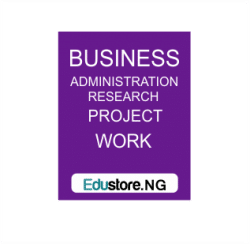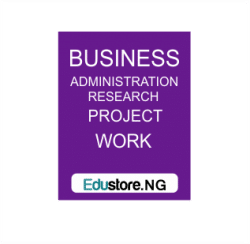ABSTRACT
This thesis is an assignment that was given as a result of Eximin Seminar held in Vasaa on 15 January 2010 by Thurmo Oy, a Finnish company that manufactures a product known as Thurmo Stop Leak used for repair and sealing of leakages in car radiators and engine block. The company intends to expand its market through the introduction of the product into the Nigerian market. This necessitated for a research on how to manage and conduct a successful business in Nigeria against the cultural diversities in the country. It was deemed very important that a research should be conducted to give a road map or reliable reference on how to manage the cultural diversities in Nigeria.
The thesis focused on creating a reference hand book for Thurmo Oy, analyzing different cultures in Nigeria, elements of intercultural communication, culture shock and its stages; reasons for management failures in Africa and possible management theories and practices that could be practically applicable in Nigeria. Comparisons were drawn between Finnish and Nigerian culture, also concepts like Nigerian moral and cultural values were evaluated and global standard business etiquettes. Furthermore, notes were given on etiquette about doing business in Nigeria. The thesis finding shows that there is market for Thurmo Oy in Nigeria. Recommendation where also given to Thurmo Oy base on the information gathered from the respondents during the research on where to start the introduction of the product in Nigeria and potential market group to target.
INTRODUCTION
This thesis is an assignment from Thurmo Oy, a Finnish company that is located at Tulkinkuja 3, Espoo, Finland. The Company manufactures a product called Thurmo Stop Leak, used for the repair of car engine radiators, cracked engine blocks and metal water cans. The product has been in existence for the past 40years and has proved to be efficient. The product was first manufactured in the USA by “Producers Ltd” in form of a sugar cube before it was manufactured in Finland by Thurmo Oy in powder sachets.
Thurmo Oy has 14 trading partners in Europe including Poland, Hungary, Romania, Czech Republic, Slovakia, Estonia, Latvia, Lithuania, Belarus, Australia, and New Zealand among others). The chemicals for the Thurmo Stop-Leak are imported from the USA and Germany, most of the production process is done through subcontracting (outsourcing) e.g. mixing of the chemical is done by a different company while packaging of the product is done by another company. Thurmo Oy has a millennium goal of increasing it sales hence the writer is making this research for the company to analyze the possible problems attached with doing business in Nigeria especially as concerned with cultural diversities in Nigeria. Thurmo Oy after its research believes it has market for its product in Nigeria but confronted with how to manage the cultural issues about doing business in Nigeria. This research thesis will explore the possibilities of doing successful business in Nigeria for Thurmo Oy by giving a comprehensive overview of the Nigeria market in relation to its cultural diversities and also proffer recommendations on necessary steps to be taken to explore the opportunity in the Nigerian market (www.thurmo.fi).
1.1 Overview of Nigeria
Nigeria is a country located in the Gulf of Guinea in West Africa and shares border with Cameroon in the east, Chad on the northeast, Niger on the North and Republic of Benin on the West. It is Africa´s most populous country and the biggest and richest country in Africa and the tenth largest country in the world, with population of about 149 million and total land area of 356,669 square miles (923,773 square kilometers). Nigeria came into existence as a result of the amalgamation of 1914 by Lord Laggard which joined the North and South together to form Nigeria. It secured her independence in the year 1960 from Britain and currently has 36 states with its capital located at Abuja. It has 6 major business cities comprising Lagos, Abuja, Aba, Onitsha, Kano and Kaduna. The country is highly blessed with natural resources e.g. Timber, Column bite, Rock Salt, Gypsum, Lead/Zinc, Bentonite and Baryte, Gemstone, Kaolin, Tantalite, Talc, Iron Ore, Tin, Oil and Agricultural farm land for both crop and arable farming.
Nigeria as a country is very diverse owing to many tribes that exist in the country. It is estimated that Nigeria has about 371 tribes and 400 spoken languages (Ethelbert E. Kari; March 2002, 1.).
DOWNLOAD COMPLETE WORK
DISCLAIMER:
- For Reference Only: Materials are for research, citation, and idea generation purposes and not for submission as your original final year project work.
- Avoid Plagiarism: Do not copy or submit this content as your own project. Doing so may result in academic consequences.
- Use as a Framework: This complete project research material should guide the development of your own final year project work.
- Academic Access: This platform is designed to reduce the stress of visiting school libraries by providing easy access to research materials.
- Institutional Support: Tertiary institutions encourage the review of previous academic works such as journals and theses.
- Open Education: The site is maintained through paid subscriptions to continue offering open access educational resources.






